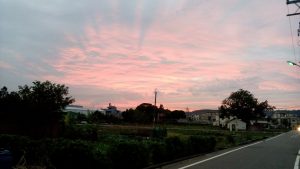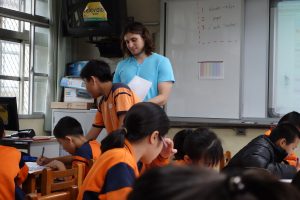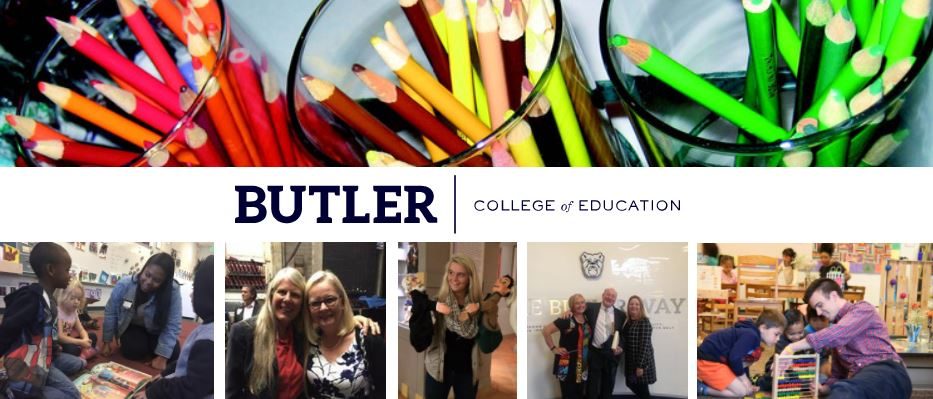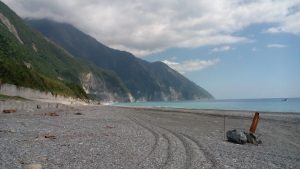My name is William N. Aaron Bork. I’m a 2011 Butler College of Education (COE) graduate. I’m now in my 4th year serving students as an education professional. For the past two years I’ve been an elementary English foreign language teacher at 公館國小 Gongguan Elementary School, in 苗栗 Miaoli County, 台灣 Taiwan. I was selected by the Taiwan Ministry of Education (MOE) Foreign English Teacher Program to provide rural Taiwanese students an opportunity to learn with educators of different cultures. The Butler COE asked me to share my experience with the Butler community and those who have a desire to ply their craft internationally. After Butler I spent two and a half years working in Indianapolis schools. During that time I completed a master’s degree and acquired Indiana state licensure in English as New Language. With a second diploma and additional credentials in hand I set about to check off a career goal – move to a foreign country. I found an opportunity with the Indiana Department of Education (IDOE) and Taiwan’s Foreign English Teacher Program.
 Taiwan’s Foreign English Teacher Program was created to provide rural Taiwanese students an opportunity to learn with educators of different cultures. Taiwan is a developing country where the difference between a rural and urban lifestyle is more than just where you call home. Taiwan’s economic and cultural delineations can be see along these lines. In the rural areas around my home, people live not very differently from how they did 50 to 100 years ago. While just a 90-minute drive north is the modern city of Taipei with a metropolitan population of 7 million and home to the world’s tallest building from 2004 – 2010. A trip to Taipei and back can feel like time travel. In rural areas the disparity in education opportunities and outcomes are manifested generationally as well. Taiwan’s current young adult work force consists of a growing college-educated population. Conversely, many grandparents of this population ended their formal education before high school. Great strides have been made to bring about this generational shift. My role here in Taiwan is just one small part of this greater effort.
Taiwan’s Foreign English Teacher Program was created to provide rural Taiwanese students an opportunity to learn with educators of different cultures. Taiwan is a developing country where the difference between a rural and urban lifestyle is more than just where you call home. Taiwan’s economic and cultural delineations can be see along these lines. In the rural areas around my home, people live not very differently from how they did 50 to 100 years ago. While just a 90-minute drive north is the modern city of Taipei with a metropolitan population of 7 million and home to the world’s tallest building from 2004 – 2010. A trip to Taipei and back can feel like time travel. In rural areas the disparity in education opportunities and outcomes are manifested generationally as well. Taiwan’s current young adult work force consists of a growing college-educated population. Conversely, many grandparents of this population ended their formal education before high school. Great strides have been made to bring about this generational shift. My role here in Taiwan is just one small part of this greater effort.
The students aren’t the only ones benefiting from this partnership. I have gained new knowledge and skills while in Taiwan. Due to cultural and linguistic barriers, teaching in Taiwan is like painting a beautiful landscape with your hands tied behind your back. Yes, you can still do the job but it requires some novel efforts to achieve the desired outcome. Also, the final product might not be as good as you know you could do otherwise. Challenge a teacher to work without the everyday methods that they take for granted and you force that teacher to strengthen previously underdeveloped skills. For example, in Taiwan I’ve improved my planning of learning activities that provide learners with multi-modal learning cues for accomplishing a task; something I took for granted in the U.S. where a verbal explanation was sufficient for most learners. Additionally, I’ve gained the knowledge and skills necessary to foster a productive cross-cultural professional relationship with local Taiwanese educators. I’ve co-taught in Taiwan. Co-teaching, true co-teaching, is a challenging yet powerful pedagogical practice. However, it takes great effort and humility between two educators to cultivate the professional relationship that underpins the practice. This challenge is greater when working with a teacher of a different culture and language than your own. Despite these successes I must note that I still struggle with adapting some previous strengths to my current contexts. For example, providing “precise praise”, praising a learner’s specific actions or behaviors rather than a generic “good job” statement, is a challenge when both the teacher and student are novices in each other’s primary languages; although my Mandarin Chinese language skills increase daily.
If this kind of work interests you or someone you know, review the following documents, contacts, and links. Furthermore, I invite you to learn more about my experience on my website: williambork.com. Lastly, I welcome interested readers to contact me via my website.
Documents to Read:
- Taiwan Ministry of Education – Foreign English Teacher Program – Overview
- Taiwan Ministry of Education – Foreign English Teacher Program – FAQ
- Taiwan Ministry of Education – Foreign English Teacher Program – Application 2016
- Taiwan Ministry of Education – Foreign English Teacher Program – Health Check Form
- Taiwan Ministry of Education – Foreign English Teacher Program – Sample Contract
People to Know:
- Vivian Huang, Project Manager (Taiwan), e-j221@mail.k12ea.gov.tw
- Jane Chen, Project Assistant (Taiwan), fetjane0730@gmail.com
- Jill Woerner, Indiana DOE Global Learning and World Languages Specialist (Indiana), jwoerner@doe.in.gov
Pertinent Links:
- Taipei Economic and Cultural Office in Chicago (TECO – Chicago)
- Processes applicant visas.
- TECO – Chicago: Education Division
- Department for various education initiatives.
- Foreign English Teacher Program Info
- Taiwan Ministry of Education Foreign English Teacher Webpage
- More info & FAQs.
- Taiwan Ministry of Education Foreign English Teacher Facebook Page
- Facebook page.


